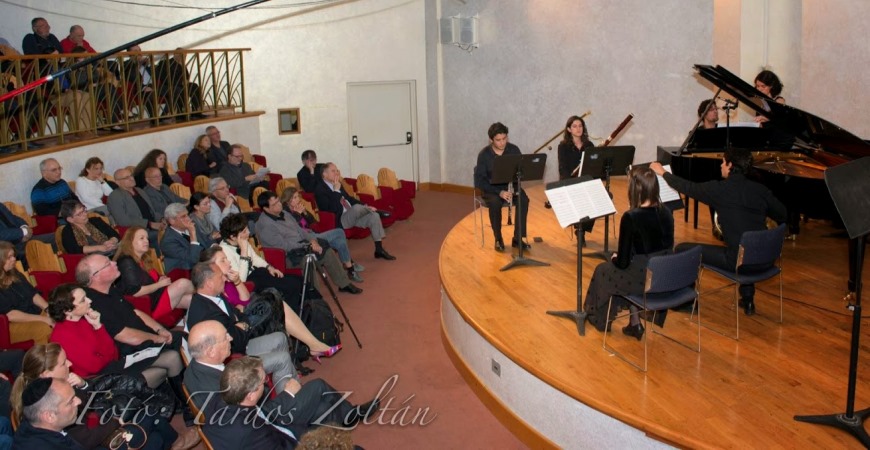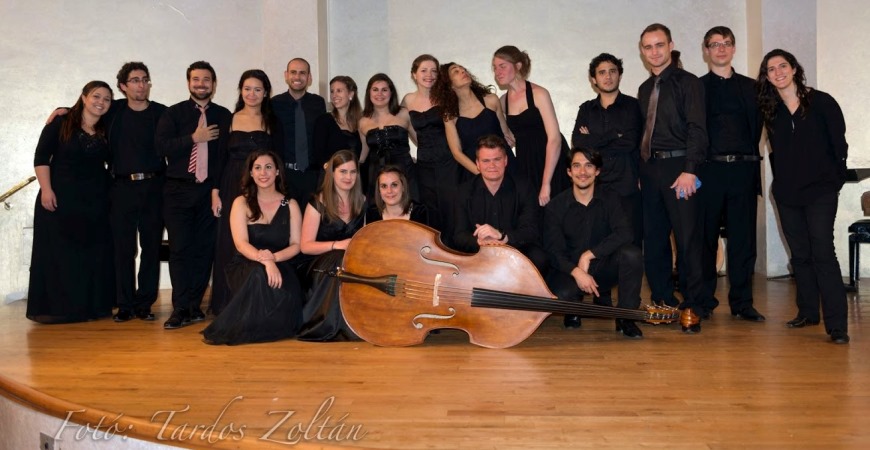Reconnections 2015
The joint workshop (now in its third year) of the Liszt Ferenc Academy of Music and the Jerusalem Academy of Music and Dance continued its work in Israel.
This year’s workshop of the two partner institutions wound up with a highly successful concert and reception in Tel Aviv on 2 March. At the closing concert, the audience rewarded the high quality performances of young musicians playing classical and contemporary chamber pieces, as well as orchestral works, with a standing ovation and cries of bravo. “Israeli radio recorded and broadcasts their concert, and through their performance they represented their schools in a worthy manner,” head of the Composition Department of the Liszt Academy Professor Gyula Fekete, who accompanied the Hungarian students to Israel, told a reporter from the news agency MTI.

Cooperation between the two universities started in spring 2013 at the initiative of Israeli Ambassador Ilan Mor, since when the programme has continued, one year in Budapest, one year in Jerusalem. Initially Hungarian students and their teachers paid a visit to Israel, while last year music students from Jerusalem came to Budapest. “Music in general and collaborative concerts specifically provide an exclusive opportunity for people from different cultures and backgrounds to meet and connect, thereby building bridges for understanding and friendship. This goes beyond the personal, and extends to the national and global spheres, eradicating xenophobia and prejudice. These are the goals we have set for this unique joint programme, the President of Liszt Academy and I,” said Ilan Mor, initiator of the workshop, in the publication introducing the Reconnections project celebrating the 25th anniversary of Israeli-Hungarian relations in 2014.
Between 23 February – 3 March 2015, ten students from Budapest arrived for a stay in Jerusalem. During this time they rehearsed and gave concerts with ten Israeli students for a week. The core concept of the workshop remained unchanged, although this year beside the string chamber music elements, wind instrumentalists also received a key role, which is why not only violinist Márta Ábrahám but clarinettist Zsolt Szatmári represented the teaching staff of the Liszt Academy.
“Since half of the students taking part in the workshop were Hungarian, and half Israeli, the Budapest preparatory rehearsals with the part ensembles only proved sufficient to evaluate the difficulties. Together with my colleague Zsolt Szatmári we urged our students to ready themselves because the programme would represent a real challenge,” said Márta Ábrahám, Assistant Lecturer of the String Department of Liszt Academy, speaking about preparations prior to their departure. Recalling the joint workshop in Israel, she added: “The rehearsals took place similarly to the chamber music classes. Originally we allocated pieces to different people, but in the end we all worked together on all the arrangements. Although earlier we had played together with Zsolt Szatmári on only one occasion, we were able to teach together with particular harmony. In effect, we led the rehearsals simultaneously, each with a score in hand; of course, he dealt more with the wind instrumentalists, and I with the strings. We should not forget about our teacher colleagues in Jerusalem, with whom we could similarly work together in consensus and complementing each other superbly.”
The repertoire included the works of Ravel, Debussy, Mozart and Copland as well as Hungarian composers Ernő Dohnányi and László Sáry. The work played at the encore was Ferenc Erkel’s Palotás, arranged by Balázs Kecskés D., student of composition at the Liszt Academy. Since over the past two years the musical, pedagogical, cultural, indeed, diplomatic significance of the Reconnections project has intensified enormously, the Jerusalem Academy presented the mutual works at three venues this year, two in Jerusalem and on the last day in Tel Aviv, which was followed by a reception at the Residence of the Hungarian Embassy.
“The concerts were an increasing, indeed, I could say without exaggeration, a fantastic success,” Márta Ábrahám said in summing up the achievements of the workshop. “It was particularly good for the students that the programme was not overly, but still a real challenge, just as were the ‘live’ concerts, which took place in front of a paying audience, radio microphones and illustrious guests. I have always believed that students develop best when ‘thrown in the deep end’; but the fact that in the course of this intensive international workshop students from different countries, different languages and musical traditions could work and appear on stage together proved an even greater challenge and adventure – especially considering that Italian, American, Costa Rican, Spanish and Estonia students also worked in the team. The participants were extremely dependent on each other and they had to be especially alert on stage – I am convinced that this situation gave them more experience than a whole year’s worth of ‘standard’ chamber music classes.”

“We learned a lot from each other,” director of the Jerusalem Academy of Music Professor Yinam Leef said when summarizing the significance of the programme. “Both academies consider the high standard of work to be important,” he stressed, adding: “The Hungarian students are great, professionally excellent and their results are impressive.” The professor assessed the seminar as being a huge success and “the meeting of two different music cultures, divergent teaching methodologies, the convergence of the Mediterranean temperament of the Israelis and European precision had a positive impact on both sides.”
One of the students of the workshop seminar, Israeli pianist Filip Solomonik, said that aside from the rehearsals it was a real experience to meet the Hungarian students. “I see on the news an anti-Israel stance in Europe but we did not experience anything of the kind; rather, we received enormous warmth, love and acceptance.” During the reception following on from the farewell concert Eszter Agárdi, a cellist who had travelled from Budapest, was quoted as saying: “It was an amazing experience for me because this was the first time I had visited Jerusalem. Professionally, too, I gained a lot because I like chamber music and I played in a lot of groups. The people here are extremely nice, kind and helpful, it was really good to work with them.” The concert’s patron and host at the reception was Andor Nagy, Hungary’s ambassador in Israel. He similarly praised the high standard of performances. “One can see what happens when these talented young musicians are brought together and become friends in just a few days. This is a short time in their lives yet I am certain that they will remember it,” he added.
In between the rehearsals and concerts the Hungarian students and their teachers still found time to go sightseeing. “We spent Saturday wandering around the old city of Jerusalem, and we had half a day in Tel Aviv, where the braver set out to explore by bicycle while the others spent their time on the beach taking in the Mediterranean sunshine and fantastically diverse – clearly not European and yet familiar in many respects – Israeli culture,” remembered Márta Ábrahám. In response to a question concerning the continuation of the workshop series, Gyula Fekete had this to say: “Last year, building on the great traditions of the Liszt Ferenc Academy of Music, the strings featured, but this year we have widened this to the woodwind instrumentalists, and we are already discussing the next steps towards the departments of contemporary compositions and singing.”
Gideon Peer also reported on the workshop in the 12 March edition of Új Kelet. The following shows the article appearing in the journal published in Tel Aviv:
ON THE WINGS OF MUSIC JOINT ISRAELI-HUNGARIAN YOUTH CONCERT
The Felicia Blumenthal Music Center can be found in Bialik Street in Tel Aviv, not far from the Karmel Market. The Center is outstanding for its beauty even among the famous houses in this renowned street. Last week the joint appearance of students of the Budapest Liszt Ferenc Academy of Music and Jerusalem Academy of Music and Dance was held in this building, which at the same time was the farewell concert. The following morning the Hungarian delegation of five violinists, two cellists and two violists returned to Hungary accompanied by their teachers, Gyula Fekete and János Devich.
Three years ago Israeli ambassador in Budapest Ilan Mor considered that it would be a good idea to create a joint artistic-educational cooperation between the two music academies. The initiator of the workshop had the idea of getting the students of the two countries to visit each other and intensify their knowledge in joint appearances. First the young Hungarians travelled to Israel and then the visit was returned by the Israelis. Now, again, Hungarian students visited Israel. They studied, practised, played music for a whole week with their Israeli companions.
The Tel Aviv concert was the closing event. Before that they played in the Eden Tamir Music Center and the Navot Hall, which are located in Givat Ram, Jerusalem Hebrew University. Teachers of the Israeli musicians: Wiesenburg Menachem and Globerzon Eitan. The latter also played the role of conductor. At the final concert (2 March), which was opened by Andor Nagy, Hungary’s ambassador to Israel, patron of the event, classical and contemporary works were performed similarly to previous occasions. The invited audience – seated in a venue suitable for presenting chamber music – rewarded the young musicians with a storm of applause. The different pieces were performed jointly, with the participation of Israeli and Hungarian musicians.
Who was Israeli and who Hungarian amongst the artists? A difficult question. They are all young, pleasant and talented. Perhaps there was just one point of reference that could help in deciding this matter. As the Hungarian musicians put it, they had a busy, tough week with many rehearsals and appearances. Still, they had time to visit the old city, the bazaar and the holy sites. Some chose the beach. As proof of this, there were sunburnt arms peeping out of evening dresses and faces painted red by the March sunlight on the Israeli seashore.
The repertoire included works by Mozart, Ravel, Debussy, Copland, Ernő Dohnányi and László Sáry. The musicians repaid the standing ovation with an encore: the music of Ferenc Erkel’s Palotás filled the concert hall, in a performance by the entire group of young musicians. The programme was followed by a reception where the audience had the chance to meet the young musicians, who returned home with new influences and new friendships. And no less important, with the knowledge that both partners can only profit and be further enriched by the two types of music culture and the differences between educational methods, the combination of the temperament of the Israelis and the European precision of Hungarians, influencing and complementing each other.


